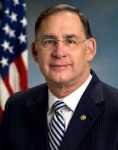- Supporting Americans with Disabilities and Their Families (3/6/25)
- Standing Up for Sportsmenís Access and Safety (2/20/25)
- Bringing Farm Country Voices to Washington (2/12/25)
- A New Front in the Fight Against Prostate Cancer (2/6/25)
- Taking Action to Reverse Immigration Failures and Protect Communities (1/30/25)
- Setting the Agenda for 2025 (1/22/25)
- Making progress for Arkansasís water infrastructure (1/16/25)
Free Meals
As students begin the new school year, U.S. Agriculture Secretary Sonny Perdue announced that summer meal program operators can continue serving free meals to all children until the end of the calendar year.
Secretary Perdue’s announcement extends U.S. Department of Agriculture (USDA) waivers for the Summer Food Service Program and Seamless Summer Option through the end of 2020, or until available funding runs out. Specifically, USDA’s actions will allow these programs to serve meals in all areas, at no cost, and without requiring children to dine in group settings or at mandated times. Meal pattern requirements will be waived as necessary, and parents and guardians will be allowed to pick-up meals for their children.
This move is a welcome development. As COVID-19 continues to impact the Natural State, the challenges and anxieties it brings for Arkansas families persist as well. USDA’s decision will provide some relief for parents as their children return to school, or remote learning, by ensuring that students continue to have access to healthy, nutritious meals.
Earlier this summer, I joined with several of my Senate colleagues to call on USDA to provide flexibilities to enable schools and other organizations to continue to offer free meals through the department’s child nutrition programs. We wanted to ensure that parents with children who rely on these programs would have one less worry for the new school year.
Over 300,000 children in Arkansas are eligible for assistance during the academic year. Many of these families were already struggling to make ends meet before the coronavirus crisis. In most cases, they have found themselves facing even more difficult financial hardships as a result of COVID-19’s hit to our economy.
Thankfully there has been help for Arkansas families struggling to put food on the table. On a recent visit to the Arkansas Foodbank in Little Rock, I was updated on the organization’s efforts to combat hunger during the COVID-19 crisis. Employees and volunteers at the Arkansas Foodbank have distributed 17.2 million pounds of food since March—a 39 percent increase from that same time frame last year. They have distributed over 120,000 boxes of food through the organization’s partner schools and agencies during that same time period.
The Arkansas Foodbank’s website has also had a dramatic spike in traffic over the past few months, resulting in a 45 percent increase in visits. A large portion of those views were from Arkansans searching for food, with additional requests coming via social media and text messages at a higher-than-normal volume than the food bank has experienced in the past.
I heard similar stories during a recent visit to the NWA Food Bank. Hunger relief organizations across the state, and across our nation, continue to see significant increases in need. Congress provided billions of dollars for food assistance in the coronavirus relief packages passed into law earlier this year, with much of that funding going directly to help those in need. As co-chair of the Senate Hunger Caucus, I am committed to helping these vital organizations provide healthy, nutritious food to Arkansans in need.
Fighting hunger in normal times takes an all-of-the-above approach across every level of government. That becomes even more important as we face a public health emergency. I am pleased USDA is taking steps to help, and I will continue to work with the administration and my colleagues to ensure that hunger relief programs remain a priority.
Posting a comment requires free registration:
- If you already have an account, follow this link to login
- Otherwise, follow this link to register

